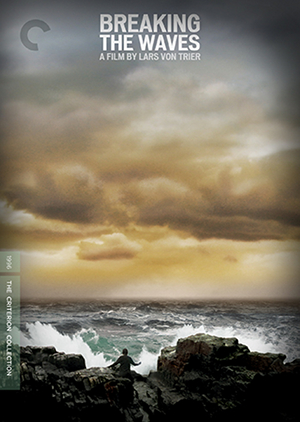Persona (1966)
Cast: Bibi Andersson, Liv Ullmann, Margaretha Krook
Director: Ingmar Bergman
Country: Sweden
Genre: Drama
Official Site: Here
Editor’s Notes: Persona is now available on Criterion Dual Format Blu-ray/DVD.
Though jarringly oblique in way of presentation, Persona is a work that’s brimming with tidy cases of contrast, ostensibly neat binaries whose borders are purposefully blurred as if to make broader points – or perhaps, to raise broader questions – about the ambiguity surrounding reality and the ways we define it. As humans, our communal sense of history has allowed us to accrue more than a few modalities for communicating our initially ineffable experiences on Earth, and director Ingmar Bergman makes it a point to underscore several of these methods throughout his 1966 “art house” prototype: His camera lingers and focuses upon gestures and the unconscious dance of hands; faces are featured in penetrating close-up to bring forth the kind of expressional wrinkles that we ourselves are blind to; and variegated methods of human invention, from letters to theater to radio to film to television, make cameos that evince how acts of art and creation have come to shape, even dominate, our concept of existence. But such examples of conveyance, particularly the manmade tertiary group, are mere constructs, and it’s important to note that Bergman understands and utilizes them as such. His film makes it not a point to explore these modes of communication, but to demonstrate the complexity and sophistication with which we attempt connection and empathy through them.
…Persona as an exposé on the crises bore of relationships, specifically how, in any pairing, the perspectives, contributions, and wants of each party will always be asymmetrical.
Sometimes, however, these mediums still feel unsuitable; they come with prefabbed barriers, if you will, that prevent us from wholly transforming our internalizations into something tangible, something consumable. Even film, which by nature is a synergistic entity, can seem an insufficient tool for exploring the depths of humanity with aplomb. With Persona, such communicational gripes are readily on display, as Bergman brings an expressive mystification for forms both feminine and cinematic to the forefront of the picture. The work becomes one that’s heavy on dissonance, as evident by an enticingly morbid prologue and agitating musical cues. In fact, the images displayed during the movie’s onset – a sheep being eviscerated, a dismayingly bristly arachnid crawling over the frame, hands being hammered to a cross, a not-so-subliminal cock shot – emit an eerie sense of compositional beauty, even if the accompanying manic presentation and contextual dearth edge the experience into the unpleasant. For Bergman, this motif marks quite the departure from his usual structural and metaphorical tendencies, which typically come as a fusion of theatrical and filmic stylings; rarely does he entertain, let alone embrace, the cryptic or discordant as aggressively as he does here – and that he calls for the picture’s celluloid façade to combust mid-film practically screams his frustrations with the limits cinematic.
 With these ideological flourishes in mind, it’s perhaps best (or at least most convenient for me) to interpret Persona as an exposé on the crises bore of relationships, specifically how, in any pairing, the perspectives, contributions, and wants of each party will always be asymmetrical. Embodying this theme are the interactions of Elisabet (Liv Ullmann) and Alma (Bibi Andersson), a dyad whose interplay makes up the majority of the narrative. The former an actress of theater and screen – who, along with being something of a surrogate for Bergman, goes suddenly and willfully mute during a performance of Electra – the latter a young, engaged nurse, the two take retreat at a doctor’s coastal home in hope that some fresh air and idyllic ambience will eventually prove cathartic. The director, however, has other things in mind. During this period of isolation, Bergman uses the women’s unique, albeit expositorily slight, personalities to begin furnishing their interactions with bouts of contrast, all while simultaneously blurring their individual senses of identity. Alma, for example, becomes a torrent of words and anecdotes, as she shares with Elisabet the specifics of a whimsical affair without ever being cued; the resigned performer seems content in just listening. This bond of theirs is one that’s initially portrayed as sororally and complimentary but eventually dissolves into something more dangerous and resentful. Feeling as if her openness isn’t being reciprocated, Alma begin to lash out with both her words and body language toward the esthetic Elisabet, whose silence, as time elapses, begins taking on a colder, more apathetic tenor.
With these ideological flourishes in mind, it’s perhaps best (or at least most convenient for me) to interpret Persona as an exposé on the crises bore of relationships, specifically how, in any pairing, the perspectives, contributions, and wants of each party will always be asymmetrical. Embodying this theme are the interactions of Elisabet (Liv Ullmann) and Alma (Bibi Andersson), a dyad whose interplay makes up the majority of the narrative. The former an actress of theater and screen – who, along with being something of a surrogate for Bergman, goes suddenly and willfully mute during a performance of Electra – the latter a young, engaged nurse, the two take retreat at a doctor’s coastal home in hope that some fresh air and idyllic ambience will eventually prove cathartic. The director, however, has other things in mind. During this period of isolation, Bergman uses the women’s unique, albeit expositorily slight, personalities to begin furnishing their interactions with bouts of contrast, all while simultaneously blurring their individual senses of identity. Alma, for example, becomes a torrent of words and anecdotes, as she shares with Elisabet the specifics of a whimsical affair without ever being cued; the resigned performer seems content in just listening. This bond of theirs is one that’s initially portrayed as sororally and complimentary but eventually dissolves into something more dangerous and resentful. Feeling as if her openness isn’t being reciprocated, Alma begin to lash out with both her words and body language toward the esthetic Elisabet, whose silence, as time elapses, begins taking on a colder, more apathetic tenor.
The dual-format packaging of Persona makes flawless use of the film’s compositional architecture, particularly its arrangement of faces and meta tendencies.
In all actuality, the contrariety of their relationship goes beyond penchants for vocalizing. Elisabet’s reticence is a divergence of her typical roles – as an actress, yes, but also as a wife and mother – as she postulates whether it’s nobler to be an imperfect, fraudulent person or to live in a detached, distant state from one’s usual self; obviously, she errs on the side of the latter. Alma represents the antithesis to this mindset, as she gushes character and accepts the flaws inherent to behaving humanly, perhaps a little more recklessly than she should; she too exhibits an annoyance for having to act differently within different social contexts, but concedes that this is merely a symptom of reality. Compared, the two seem like orderly examples of intro-and-extroversion, that is, until Bergman hints that they could be shades of the same psyche. For a filmmaker who often relies on clunky, theater-spawned expository devices – too often do his characters spout off their backstory and circumstance to the audience – this kind of abstraction is at once novel and welcome. Even more enriching is how he molds the interactions of the principles into a commentary on those between artists and their audience. When a letter written by Elisabet challenges Alma’s perception of their partnership, Bergman is, in actuality, critiquing the dynamic between the observer and the observed, insisting that, in spite of appearances, some kind of exchange amongst the two must always exists – that two entities won’t find a connection if one attempts to monopolize a behavior, be it speaking or listening.
In trying to suss out coherency and meaning from one of the director’s more enigmatic creations, I’ve come to appreciate it more, yes, but I still holding many of his other pictures in quite higher esteem (The Virgin Spring, Fanny and Alexander, The Seventh Seal, Scenes from a Marriage, The Magic Flute). Admittedly, Persona is a far more productive channel for Bergman’s personal and vocational dismays than his previous effort, All These Women, an unstable sex farce that assigned critics a foppish, parasitic proxy that thrived in the wake of brilliant artists such as himself (the likes of which have a veritable harem at their disposal). Of course, some of the details from this comedy were meant to be cheeky, and function to self-depreciatingly acknowledge the accusations of philandering that he’s faced throughout his career. But the problem with All These Women is the lack of dimensionality amongst the characters, especially since they’re supposed to be in some ways emblematic. At least in Persona he’s able to note the give-and-take components of relationships and acknowledge that human expression thrives not as a series of monologues – even if the realization brings him dejection and terror.
Transfer
The ideological and interactive disparities that run rampant throughout Persona are only augmented by the rich chromatic disparity of Sven Nykvist’s photography, which pins bottomless blacks against immaculate whites, all while preserving the finer details of facial landscapes. Criterion’s 1080p treatment is a deserving effort for a film that shifts its palette from ethereal to earthly so readily, with the transfer enhancing the wider, scenic shorelines and the claustrophobic, textural depths of the actress’s visages. In instances of both visual and aural concern, the product is stable and free of extraneous signs of aging. This is, in short, one a radiant depiction of an artist’s ugliest period, even by filmic standards.
Extras
The dual-format packaging of Persona makes flawless use of the film’s compositional architecture, particularly its arrangement of faces and meta tendencies. That, and the cardboard boxes, while not as durable, always allow for more personality and variety than the standard plasticity of Criterion’s usual cases. The supplemental features housed therein offer a nice variety, and tackle the film in a piecemeal manner that’s apropos of its structure. The interviews bestow a quaint look into the film’s major players, even as they drift into repetitious territory and Bergman’s trademark arrogance and elusiveness comes into view. If anything, the contextualization that super-fan Paul Schrader attempts is more interesting in that he compares the formalism of Persona to French New Wave works that Bergman was often critical of. Aside from the typically strong contextual presence in the accompanying booklet, the extras round out with Liv & Ingmar, a full-length documentary that feels included for inclusion’s sake, but will nonetheless give the director’s fans something to pour over after they, thanks to Criterion (and maybe Hulu+), rabidly exhaust his formidable filmography.
[notification type=”star”]79/100 ~ GOOD. Though jarringly oblique in way of presentation, Persona is a work that’s brimming with tidy cases of contrast, ostensibly neat binaries whose borders are purposefully blurred as if to make broader points – or perhaps, to raise broader questions – about the ambiguity surrounding reality and the ways we define it. [/notification]


